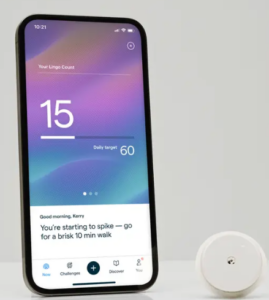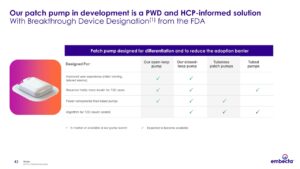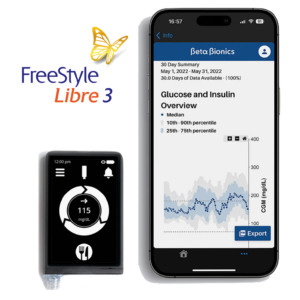Abbott debuts Lingo over-the-counter CGM in the US by Elise Reuter for MedTechDive.com, 6 September 2024. Priced at $49 for one 14-day sensor, or $89 per month, Abbott’s offering is competitive with Dexcom’s Stelo sensor.
 Abbott’s Lingo is intended to show people how diet and exercise affect blood glucose levels. The sensor hardware is similar to Abbott’s prescription CGMs, but the app presents different information. The app includes a graph of glucose readings, a count of glucose spikes, and food and activity logging. It also offers tailored recommendations based on food, time of day and glucose spikes.
Abbott’s Lingo is intended to show people how diet and exercise affect blood glucose levels. The sensor hardware is similar to Abbott’s prescription CGMs, but the app presents different information. The app includes a graph of glucose readings, a count of glucose spikes, and food and activity logging. It also offers tailored recommendations based on food, time of day and glucose spikes.
Dexcom’s Stelo CGM, which is a 15-day sensor, includes similar features and tracks time-in-range, a measurement of how long users stay in a desired blood sugar range. Stelo is intended for people with diabetes who don’t take insulin, although it can also be used by people without diabetes. Abbott plans to debut another OTC sensor designed specifically for people with diabetes, called Libre Rio.
Read more: Abbott debuts Lingo over-the-counter CGM in the US
Embecta secures FDA clearance for insulin patch pump in Type 1 and Type 2 diabetes by Conor Hale for FierceBioTech.com, 3 September 2024.
 Embecta has secured an FDA clearance for its first wearable insulin delivery system, with a patch pump designed for people with either Type 1 or Type 2 diabetes. The fully disposable device includes a 300-unit insulin reservoir, which embecta said could last most users with Type 2 diabetes about three days, based on the average amounts taken by people relying on multiple daily injections to control their blood sugar levels. The new wearable, which received a 510(k) clearance as an alternate controller-enabled insulin infusion pump, also connects with a dedicated, touchscreen-operated controller unit. (Please note: This is a TERRIBLE graphic … but the only one I could find … I guess their marketing is not yet up to speed!)
Embecta has secured an FDA clearance for its first wearable insulin delivery system, with a patch pump designed for people with either Type 1 or Type 2 diabetes. The fully disposable device includes a 300-unit insulin reservoir, which embecta said could last most users with Type 2 diabetes about three days, based on the average amounts taken by people relying on multiple daily injections to control their blood sugar levels. The new wearable, which received a 510(k) clearance as an alternate controller-enabled insulin infusion pump, also connects with a dedicated, touchscreen-operated controller unit. (Please note: This is a TERRIBLE graphic … but the only one I could find … I guess their marketing is not yet up to speed!)
Looking ahead, Embecta is developing a closed-loop version of its tubeless patch pump, which would automatically respond to readings from a continuous glucose monitor. For the insulin-dosing algorithm, the company has been collaborating with diabetes software developer Tidepool
Read more: Embecta secures FDA clearance for insulin patch pump in Type 1 and Type 2 diabetes
Abbott partners with maker of ‘bionic pancreas’ by Nick Paul Taylor for MedTechDive.com, 5 September 2024.
 Beta Bionics designed iLet to automate insulin dosing while minimizing manual data entry. Other AID systems require users to enter data such as basal rates, insulin-sensitivity factors and carbohydrate-to-insulin ratios when they start using the devices. In those cases, users need to input the grams of carbohydrates in each meal they eat. The iLet system asks users to share their body weight when they first set up the device and choose from one of three carbohydrate levels for each meal. Beta Bionics received 510(k) clearance for the product in May 2023.
Beta Bionics designed iLet to automate insulin dosing while minimizing manual data entry. Other AID systems require users to enter data such as basal rates, insulin-sensitivity factors and carbohydrate-to-insulin ratios when they start using the devices. In those cases, users need to input the grams of carbohydrates in each meal they eat. The iLet system asks users to share their body weight when they first set up the device and choose from one of three carbohydrate levels for each meal. Beta Bionics received 510(k) clearance for the product in May 2023.
Since then, Beta Bionics has worked to integrate the device with CGMs. The company updated firmware to integrate the device with the Dexcom G7 CGM in December. Partnering with Abbott positions Beta Bionics to integrate with the latest CGMs from the two market leaders in the U.S.
Beta Bionics plans to provide a software update that allows iLet users to select Freestyle Libre 3 Plus as their CGM when they set up a new sensor. The Food and Drug Administration cleared Abbott’s Freestyle Libre 2 and 3 for integration with AID systems in March 2023.
Read more: Abbott partners with maker of ‘bionic pancreas’
Being mentally resilient could cut your risk of death by 53 per cent bu Abbie Jordan for ScienceFocus.com, 4 September 2024.
 Feeling that there is more to cope with as you get older? Well, it turns out that how you deal with life’s challenges could make the difference to your lifespan. That’s because new research has revealed that being more resilient to life’s ups and downs as you age might actually cut your risk of death. The new study, published in BMJ Mental Health, showed that adults with the highest levels of mental resilience had the lowest chance of dying, cutting their risk of death by a whopping 53 percent.
Feeling that there is more to cope with as you get older? Well, it turns out that how you deal with life’s challenges could make the difference to your lifespan. That’s because new research has revealed that being more resilient to life’s ups and downs as you age might actually cut your risk of death. The new study, published in BMJ Mental Health, showed that adults with the highest levels of mental resilience had the lowest chance of dying, cutting their risk of death by a whopping 53 percent.
Mental resilience is an active process that changes across your lifespan and is influenced by factors such as your sex, hormones and genes that regulate the body’s stress response. But having meaning in life, positive emotions, and satisfaction with social support can all also impact your resilience. “Triggering these positive emotions may enhance the protective effects of psychological resilience and mitigate the negative impact of accumulated adversity on mental health in adult,” the paper’s authors, from Sun Yat-sen University, China, and the Karolinska Institutet, Sweden, said.
In fact, the researchers think that mental resilience could have similar effects to bouncing back physically after illness and trauma, as good coping skills may offset the negative impacts of tough times. That means that, while you cannot control what life throws at you as you age, how you deal with these problems could be literally life-lengthening.
Read more:
Keep Calm and Kidney On…How to Be a Renal Rockstar with T1D! by TCOYD.org, 28 August 2024.
Diabetes and kidney health are closely connected, but kidney disease is not inevitable. Drs. E+P share tips on prevention, protection, and treatment options so you can reduce your risk and maintain a greater quality of life.


Imagine my great joy in getting the weekly update today. I am impressed with the implantable sensor. The manufacturer should take note. Users will want that.